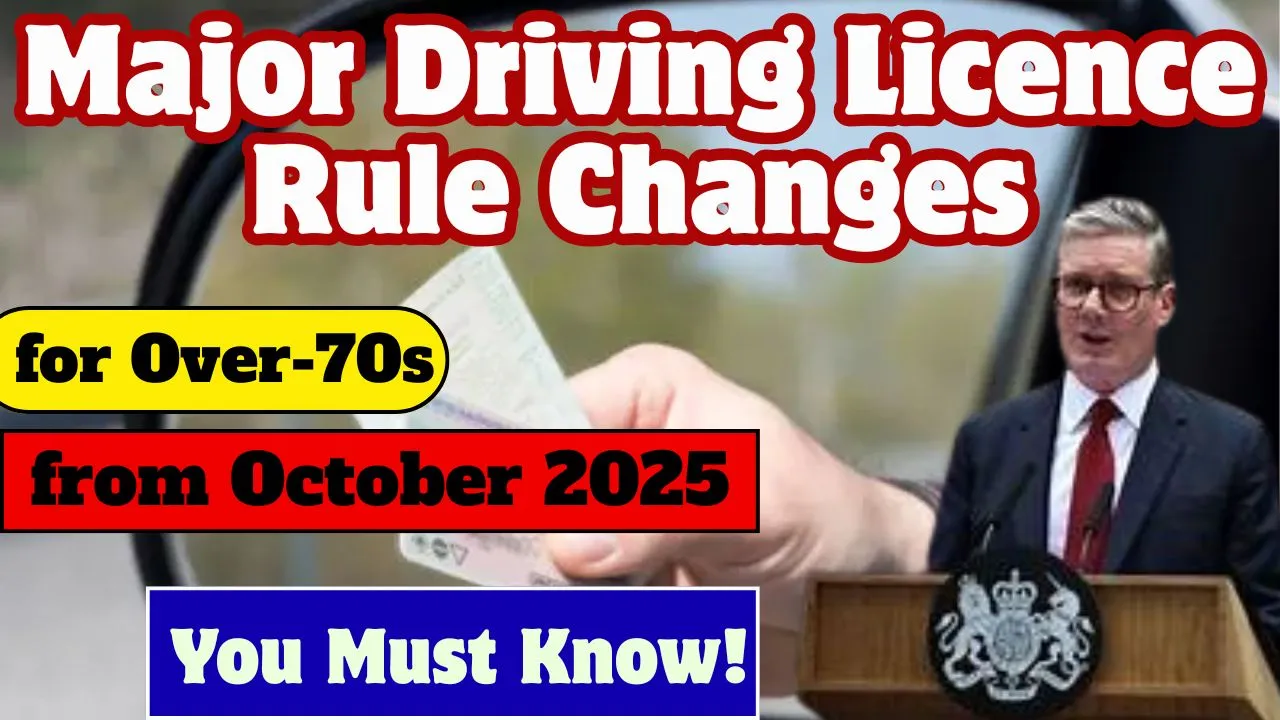From October 2025, Driving Licence Rule Changes Over 70s will reshape how senior drivers renew and maintain their licences. If you’re approaching or past age 70, it’s crucial to know what’s coming so you don’t end up scrambling at the last minute. The goal isn’t to take away your freedom to drive—but to ensure safety while respecting independence.
These Driving Licence Rule Changes Over 70s introduce stricter assessments, shorter renewal cycles, and more in‑person checks. In this post, I’ll walk you through the new rules, how they may affect you, what you need to prepare, and answer common questions so you can steer into 2025 with confidence.
Driving Licence Rule Changes Over 70s
From October 2025 onwards, many jurisdictions will require drivers aged 70 and older to comply with enhanced renewal protocols. With the Driving Licence Rule Changes Over 70s, renewal cycles become shorter—often 2 to 3 years instead of the typical 5 to 10. You’ll likely need to visit the licensing office in person, even if renewals used to be available online or by mail. As part of the process, expect mandatory vision tests, reaction‑time or cognitive screenings, and possibly medical fitness checks. In some places, if concerns are flagged, you might even be asked to take a driving test. The aim is not to penalize elders but to assess driving ability more often and tailor restrictions where needed.
Overview Table
Here’s a quick reference table to show what’s changing:
| Aspect | New Requirements / Changes | Why It Matters |
| Renewal Interval | Senior licences may now expire every 2–3 years rather than 5+ years | More frequent check‑ins on health and ability |
| In‑person Renewal | Renewals for 70+ must often be done in person | Enables staff to verify identity and administer tests |
| Vision & Reaction Tests | Vision screening, reaction time, cognitive checks | To catch a decline in vision or reflexes early |
| Medical Fitness Checks | Doctors may need to certify health, especially if conditions exist | Ensures safety given health risks |
| Reporting of Impairment | Doctors, family, and caregivers may report concerns | Triggers re‑assessment if needed |
| Optional Road Test | For drivers flagged or older brackets | Verifies real‑world driving ability |
| Conditional or Restricted Licences | Driving allowed under limited conditions (daylight only, local roads) | A middle ground instead of full revocation |
| Jurisdictional Variation | States or regions adopt adaptations | Local rules may differ significantly |
Why Authorities Are Introducing These Changes
As life expectancy rises and more seniors remain active drivers, authorities face a dilemma: how to protect public safety while preserving mobility. Natural aging often brings slower reflexes, vision decline, and health conditions that may impact driving. The Driving Licence Rule Changes Over 70s aim to catch risks early, avoid major incidents, and allocate interventions where needed—not punish all drivers over 70 indiscriminately.
Taking a capability‑based approach means older drivers who are still safe can continue driving, while those with emerging issues get help or restrictions before accidents occur. It’s a shift from blanket age thresholds to individual risk assessment.
What Tests and Checks Can You Expect
Under the new regime, a driver aged 70+ may face several assessments at renewal time:
- Vision screening: Confirming that eyesight meets minimum legal standards
- Reaction time / cognitive test: Simple tasks to check responsiveness and decision-making
- Medical questionnaire or evaluation: Especially if you have conditions like heart disease, diabetes, or neurological issues
- Road test: In some jurisdictions or if flagged by assessors
- Disclosure requirements: You may need to report new medical diagnoses (e.g., memory issues) promptly
Failing one of these tests doesn’t necessarily mean losing your licence—but it could mean driving restrictions (daytime only, no highways, limited zone).
In‑Person Renewal and Regional Differences
One key shift is that online or mail renewal might no longer suffice for 70+ drivers. Renewals may require your physical presence at the licensing office so officials can verify documents and conduct tests. This move helps reduce fraud and ensures assessments truly reflect current ability.
However, because licensing is handled by states or regions, the implementation of these Driving Licence Rule Changes Over 70s will vary. Some areas might allow mobile vision testing units or special clinics; others may enforce stricter testing. Always check with your local licensing authority well before your renewal window.
Reporting Concerns & Triggered Reassessment
A more controversial change is the introduction of reporting mechanisms. If a doctor, family member, caregiver, or concerned citizen reports a driver’s declining ability, authorities may require a reassessment. This allows issues to be brought forward proactively—but it also demands fair handling, checks against abuse, and transparent appeals.
These protections are crucial: no one should lose their licence simply because of a mistaken or malicious complaint. Many systems will include review procedures and second opinions.
Restricted Licences as a Safe Compromise
Rather than outright revoking a licence for minor issues, many systems will provide restricted licences as a compromise. Possible restrictions include:
- Daylight-only driving
- Local / neighbourhood zones (no highways)
- No driving in bad weather or heavy traffic
- Avoidance of nighttime or long-distance trips
This approach allows capable seniors to continue driving for essential tasks while minimizing risk in more challenging conditions.
Tips to Prepare & Stay Ahead
To navigate these changes smoothly, here’s what you can do well ahead:
- Check your local licensing office: know what your region requires under the new changes.
- Get a full eye exam and health check, even before renewal is due.
- Gather necessary documents: proof of identity, medical records, past licence, etc.
- Consider a driving refresher course designed for older drivers.
- Track your medical conditions and report any changes in a timely way.
- Prepare mentally for potential restrictions and accept them as safety‑based, not punitive.
Final Thought
These Driving Licence Rule Changes Over 70s coming in October 2025 represent a major shift in how senior licences are handled. If you’re near that age group, I urge you to read your local licensing policy, start preparing now, and share this with others who need to know. Feel free to comment with your state or country so I can help you with local details—and don’t forget to share this article so others can stay informed!
FAQs
No. The changes focus on testing ability, not age. Many will pass safely and continue driving with no change.
Not necessarily. Road tests will usually be required only if flagged by assessments or for the oldest age brackets.
You may be placed under restrictions or asked for further medical evaluation, not necessarily revoked.
Yes, reports from doctors or family members can trigger reassessments. But the system should allow appeals and reviews.
In many cases for senior drivers, the licence validity will shorten to 2 or 3 years, rather than the typical longer interval.







